Memory technology
advances and expands
versatility
Approaches to main memory and cache RAM are
still not solidified,
while nonvolatile memory offers more choices
than ever
BY RODNEY MYRVAAGNES
Associate Editor
Uncertainty prevails regarding the DRAM future, with manufacturers coming down firmly on every scheme that might catch on. Likewise, flash memory is split by programming method and cell structure according to purpose.
However, embedded DRAM is becoming important and seems likely to grow as the 256-Mbit generation allows significant logic to be placed on the memory chip. Following is a sampling of announcements and preannouncements from many memory vendors.
Cache RAMs aim at PCs
and workstations
Motorola Semiconductor (Austin, TX) offers a highly integrated PowerPC cache RAM with a 32-K x 72 array and an 8-K x 18-bit tag, along with a host interface and four-way set-associative control logic. The part handles 2-1-1-1 bursts at 66 MHz. It is packaged in a 25-mm-square PBGA. The MPC2605 is $45 each in lots of 1,000 and is available now.
Cypress Semiconductor (San Jose, CA) has ramped up its 0.35-µm process into production of a 64-K x 16-bit asynchronous SRAM. Like all of the company's new SRAM designs, it uses six-transistor cells. The company has working 0.25-µm silicon, and expects to migrate its production process to that scale by midyear.
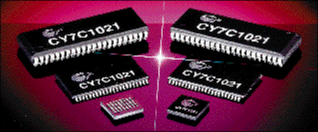
Cypress Semiconductor uses six-transistor cells in all its new SRAM series.
Standby current is 300 µA and access time is 10 ns for the 35-µm part. It comes in 5- and 3.3-V versions in SOJ, TSOP II, and mini-BGA packages. The CY7C1021 is $5.45 each in lots of 10,000 and is available now.
Paradigm Technology (Milpitas, CA) has pushed the speed of its 64-K x 16-bit asynchronous SRAMs to 9 ns, adding to its previous grades of from 10 to 15 ns. The parts come in 400-mil 44-pin SOJ packages and TSOPs. The PRDM31532-09 is $15.50 each in lots of 1,000 and is available now.
Toshiba America (Irvine, CA) is in full production of 2-Mbit standard SRAM. The 256-K x 8-bit parts have 70-ns access at 2.7 to 3.6-V operation.
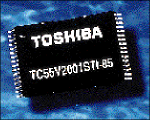
Toshiba's standard 2-Mbit SRAMs are available in all surface-mount packages, including the new chip-scale BGA.
In addition to SOPs, TSOPs, and STSOPs, the chips will be packaged in chip-scale BGAs. The TC55V2001- ST1-85 is $7 each in lots of 1,000 and is available now.
Galvantech (Santa Clara, CA) offers two pipelined and two flow-through 4-Mbit synchronous-burst SRAMs. The parts are organized as by 36 and by 18. Clock speeds are available up to 117 MHz for the flow-through parts, and 166 MHz for the pipelined.
Packaging is in 100-pin TQFPs and 119-pin PBGAs. The 10-ns flow-through GVT71128E36 and the 117-MHz pipelined version, the GVT-71128G36 both cost $66.88 each in lots of 1,000.
DRAMs advance, but standards
don't shake out yet
NEC (Santa Clara, CA) is in full production of a 16-Mbit SGRAM that runs from 3.3 V at speeds up to 143 MHz. This is in addition to the company's line of RDRAMs and 64-Mbit SDRAMs. The SGRAM comes in a TQFP. The part is $11 each in lots of 10,000.
Mosys (Sunnyvale, CA) has extended its multibank DRAM technology to make SGRAMs as well. The MG802C256 is a 256 K x 32-bit version offering a 150-MHz clock rate.
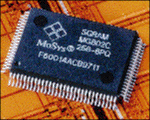
Mosys has used its multibank DRAM process to make a 150-MHz SGRAM.
It features 5-ns clock-to-output timing, and is pin and function compatible with JEDEC SRAMs. The part comes in 100-pin PQFPs and LQFPs and is available for $10.50 each in lots of 1,000.
Samsung Semiconductor (San Jose, CA) is ramping up production of 16- and 18-Mbit Rambus Concurrent RDRAMs at the 600-MHz speed. The 3.3-V KM48RC2 devices come in 32-pin SHP packages.
The company has also introduced 16-Mbit SGRAMs at 100, 125, and 143 MHz. The 100/125-MHz KM-4132G512 has an LVTTL interface. The KM4132G513 has a faster SSTL interface that allows bus speeds up to 143 MHz. These are packaged in 100-pin PQFPs or TQFPs.
The KM48RC2-A60 is $18.75 each in lots of 1,000; the KM4132G512-8 is $16 each in lots of 1,000; and the KM4132G513-7 is $19 each in lots of 1,000. The company also has first silicon on double-data-rate 64-Mbit SDRAMs and expects production this year.
Mosel Vitelic (San Jose, CA) offers 64-Mbit EDO DRAMs in 40-, 50-, and 60-ns grades. The 40-ns grade offers a 16-ns EDO page-mode cycle time for a 63-MHz sustained data rate.

64-Mbit EDO DRAMs from Mosel Vitelic have access times as fast as 40 ns.
The parts come in by 4-, 8-, and 16-bit organizations, V53C316540-500, V53C316580500, and V53C- 3116516500 respectively. The 60-ns parts are $35 each in lots of 1,000.
Enhanced Memory Systems (Colorado Springs, CO) has reached a foundry agreement with IBM for the manufacture of the company's ESDRAMs. The ESDRAM has been proposed to JEDEC as an SDRAM-superset standard.
The ESDRAM family consists of 4-M x 4-, 2-M x 8-, and 1-M x 16-bit parts in 44- or 50-pin TSOP-II packages, as well as in DIMM and SO DIMM modules. Clock rates of 100, 133, and 166 MHz will be produced.
The 100-MHz ESDRAMs comply with the fastest latency requirements for the Intel PC-100 specification with Pentium II chipsets. The 166-MHz parts, along with the VLSI Technology Polaris chipset and a 533-MHz Alpha 21164PC, achieve a peak bandwidth of 1.6 Gbytes/s.
Micron Technology (Boise, ID) is manufacturing 64-Mbit SDRAMs in a 0.25-µm process. The parts come in standard 54-pin TSOPs in 4-, 8-, and 16-wide organizations. The company is also sampling 100-MHz DIMMs in 8-M x 64/72-bit and 16-M x 64/72-bit sizes. Prices are similar to those for EDO DRAMs of the same sizes.
Texas Instruments (Dallas, TX) announced selected sampling of 16-Mbit SDRAMs that comply with Intel's PC-100 specification. With a die size of 37 mm2 , the parts should be inexpensive enough for use in entry-level PCs. Column-address strobe latency is two clock cycles, rather than the more common three. Production is expected soon this year.
Flash memories aim at
mass storage, low cost
Intel (Santa Clara, CA) has started using four-level recording in flash cells to store 2 bits per cell. Multilevel recording was previously restricted to audio streams, where an occasional bit error could be tolerated.
The parts, called StrataFlash, are available in two densities. Both operate at 5 V and record at 6 µs/byte. The 64-Mbit 28F640J5 is $29.90 each in lots of 10,000 and samples are available now. The 32-Mbit 28F320J5 will be $15.40 each in lots of 10,000 and samples will be available in the first half of the year.
Mitsubishi (Sunnyvale, CA) announced 16-Mbit DINOR MobileFlash memory with access times as fast as 80 ns. The single-supply 3.3-V parts are pin compatible with the company's 8-Mbit parts. Motorola (Phoenix, AZ) and Hitachi (Brisbane, CA) also supply DINOR parts by agreement.
Two types of MobileFlash are offered. The M5M29FB/T160A offers a top or bottom boot block and a by 8- or 16-bit organization. The M5M29-FS016A is a 2-M x 8-bit symmetrical block part. Both are available in 48-pin TSOPs and will be available before summer in a 48-pin chip-scale BGA. Each version is $13.50 each in lots of 10,000.
Silicon Storage Technology (Sunnyvale, CA) announced Many-Times-Programmable (MTP) flash products to compete with EPROMs in the low-cost market. The devices can be erased and reprogrammed in a few seconds at least 1,000 times using an external programmer.
The parts use 12 V for programming and erasure, and read at 5.0 or 2.7 V. The first device is 128 K x 8 bits, and will be followed by others up to 4 Mbits. Pinout is compatible with standard OTP memories. The SST27SF010 is $1.40 each in lots of 100,000, and samples are available now.
Advanced Micro Devices (Sunnyvale, CA) has introduced a 1.8-V family of single-voltage flash memory ranging from 8 to 32 Mbits. Read-access times range from 100 to 170 ns.

AMD's latest single-voltage flash memories run from a 1.8-V supply.
Process technology and architecture of the 1.8-V family is the same as for the 2.7-V equivalents. The parts come in 48-pin TSOPs and fine pitch BGAs. The Am29SL800-170EC is $8.35 each in lots of 10,000.
SGS-Thomson Microelectronics (Lincoln, MA) offers a range of 2.7-V industry-standard single-supply 4-Mbit flash memories. The M29W- 040 is 512 x 8 bits with equal 64-Kbyte blocks, while the M29W400 and '004 have boot blocks and can be configured either as 512 K x 8 or 256 K x 16 bits.
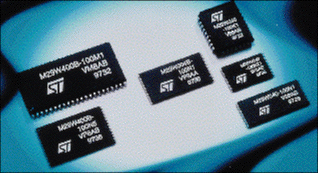
SGS-Thomson's low-voltage 4-Mbit flash memories are industry-standard plug replacements.
The dual-organization parts are packaged in 48-pin TSOPs or 44-pin SOICs. The by-8 parts are in 40-pin TSOPs ('004), and in 32-pin TSOPs or PLCCs ('040). Access times are 100 ns. The M29W040/400/004 are $6, $6.90, and $6.50 each in lots of 10,000, respectively.
Sharp Electronics (Camas, WA) has introduced 16- and 32-Mbit Smart Voltage NOR-cell flash devices that support Common Flash Interface software. Both are available in chip-size BGA as well as TSOP and SOPs. The 16-Mbit part is $15 each in lots of 1,000; the 32-Mbit part is $30 each in lots of 1,000.
Serial memories keep data
both alterable and secure
Xicor (Milpitas, CA) has developed a secure serial EEPROM for smart-card applications. It has 896 storage bits, guarded by two 64-bit passwords. One password protects read access; the other write access.
The chip has a 1-Mbit/s two-wire interface. Its retry circuit allows eight password attempts before clearing the memory. The chip is available in 8-pin PDIPs, SOICs, and MSOPs, as well as embedded in a smart card with customer printing. The X76F100 is $0.65 each in lots of 10,000, and the X76F100Y smart card is $1.30 each in lots of 10,000. Samples are available now.
Microchip Technology (Chandler, AZ) announced 1- and 2-Kbit I2 C serial EEPROMs that provide software address capability for up to 255 devices on one bus, allowing flexible plug-and-play configuration. Addresses are assigned at power-up.
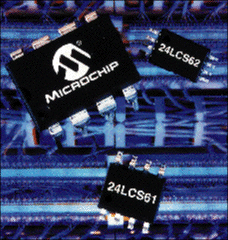
Microchip's plug-and-play serial flash parts are software addressable, with as many as 255 devices on a line.
Each device also has an unchangeable 48-bit serial number. A design kit is available from the company. The 24LCS61 is $0.95 each in lots of 1,000, and the 24LCS62 is $1.17 each in lots of 1,000. Samples are available now.
Catalyst Semiconductor (Sunnyvale, CA) has extended its line of 400-kHz extended I2 C serial EEPROMs with the 128-Kbit 24WC128. The part comes in 1.8 to 6.0-V and 2.7 to 6.0-V ranges. It has Schmitt trigger inputs, allows 100,000 cycles min, and provides a 100-year retention. The 24WC128 is $2 each in lots of 10,000.
Altera (San Jose, CA) offers a 441-Kbit configuration EPROM for RAM-based programmable logic, such as the company's FLEX 6000 family. The part is packaged in a 32-pin TQFP, 8-pin DIP, or 20-pin PLCC. The EPC1441 is $3.50 each in lots of 100.
SRAMs are organized for DSP
Integrated Device Technology (Santa Clara, CA) mounts its own SRAM chips in multichip BGA packages, with 16- and 24-bit widths for use with DSP devices.
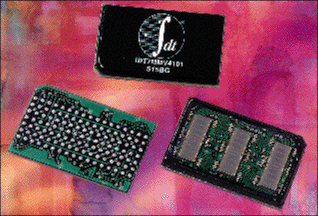
IDT packages its own SRAMs in multichip BGA modules.
The SRAMs are packaged in JEDEC-standard 74- and 119-pin BGAs. The 24-bit IDT-7MMV4101 is $32 each in lots of 10,000, and the 16-bit IDT7MMV- 4103 is $19 each in lots of 10,000.
Integrated Silicon Solution (Santa Clara, CA) has introduced the IS61LV12824, a 128-K x 24-bit asynchronous SRAM with a 10-ns access time. The part interfaces directly to 24-bit DSPs such as the 56300 family. A pair mates to the 48-bit SHARC.
The device eliminates wait states up to 100 MHz. It is packaged in 199-pin PBGA and 100-pin TQFPs. The device is $28 each in lots of 5,000.
Also offered is a “virtual dual-port” SRAM–the IS82C600–aimed at DSP applications. The 64-K x 16-bit asynchronous RAM uses conventional SRAM cells along with external logic to bring two ports out.
The ports cannot access the same cell simultaneously, but one port can be feeding a stream of data or coefficients to the processor at up to 133 MHz, depending on DSP timing, while the other port is in use at other parts of the chip. The part, which comes in a 119-pin BGA, is $12 each in lots of 10,000.
Battery-backed chips
surface mount
Dallas Semiconductor (Dallas, TX) has a line of SRAMs with a clock/calendar function specially packaged to be surface-mounted. To avoid the soldering heat, the battery is mounted in a piece called PowerCap that snaps on after soldering.
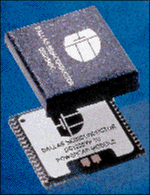
The snap-on upper part of this Dallas Semiconductor RAM/clock-calendar part contains the heat-sensitive lithium cell, allowing surface mounting of the lower package.
SRAMs and time-keeping RAMs are available in this configuration. The nonvolatile SRAM devices are from $6.62 each in lots of 10,000; timekeeping devices are priced from $13.18 each in lots of 10,000; PowerCaps are $3 each in lots of 10,000.
SGS-Thomson Microelectronics offers the Timekeeper family of battery-backed SRAMs with clock. Like the Dallas parts, these are in a surface-mount SOIC package with the battery and crystal in a snap-off piece, called SnapHat. The SOIC memory is $12.50 each in lots of 5,000. SnapHat, with battery and crystal, is $2.08 each in lots of 5,000.
Specialty memories follow
their own paths
Hitachi America (Brisbane, CA) offers modularized 100-MHz DRAM cells in its HG73M series of cell-based ASICs. DRAM cells up to 140 Mbits are possible, and can share a chip with a 16-bit H8S or 32-bit SuperH microprocessor core. All are fabricated in a 0.28-µm DRAM process.
Mitsubishi Electronics America (Sunnyvale, CA) expects to ship products in the 0.25-µm shrink of its HyperDRAM embedded-memory process in the first half of the year. The process will allow 64-Mbit DRAM to share a die with logic, as in the company's M32R/D.
With internal memory buses up to 256 bits wide and 85-ps logic delays, microprocessors should run at 150 MHz. A further shrink to 0.18 µm by year's end will expand capacity to 256 Mbits and 250 MHz.
Honeywell (Minneapolis, MN) has introduced a 32-K x 8-bit SRAM, the HT6256, to its high-temperature HTMOS line. The part operates in temperatures from –55° to +225°C with guaranteed full performance. All parts in the line are pretested and last tens of thousands of hours running at 225°C.
The HT6256 also works with reduced performance up to 300°C. The part has CMOS I/O levels and uses a single 5-V power supply. It uses less than 30 mW/MHz running and less than 10 mW unselected. The part is asynchronous and has a typical access time of 50 ns. It is $399 each in lots of 100.
Fujitsu Ltd.(Kawasaki, Japan) and Ramtron International (Colorado Springs, CO) disclosed a memory-device-processing technology at IEDM 97 that enables CMOS logic and Ramtron's ferroelectric RAM (FRAM) to be integrated on a single chip simply and at low cost. Using this embedded technology, Fujitsu and Ramtron have developed a prototype device that combines an 8-bit microcontroller and 64-Kbit FRAM on a single chip.
In addition to the FRAM and CPU, the embedded chip includes 8 Kbits of ROM and 1 Kbit of SRAM. Fujitsu expects to announce the device as a product during 1998.
Music Semiconductors (Hackettstown, NJ) has extended the utility of its LANCAM content-addressable memory products with a pair of Ethernet-specific interface chips: the 10-MHz single-port MU9C8328 and the 10/100-MHz 4-port MU9C8358. Both chips connect directly to a LANCAM and to common Ethernet controllers having an NRZ serial port.
The chips separate destination and sender addresses from the serial stream, find duplicates or add new entriesin the LANCAM, and provide information to the host processor. The '8328 is $7 each in lots of 1,000 and packaged in a 100-pin PQFP; the '8358 is $40 each in lots of 1,000 and packaged in a 208-pin PQFP.
Fairchild Semiconductor (South Portland, ME) has announced a pair of 16-bit LVX logic devices specifically designed to fit the JEDEC JC21 specification for 168- and 200-pin SDRAM DIMMs. The 74VCX16838 enables LVTTL I/O modules to run at memory-bus speeds up to 125 MHz. The 74VCX162838 adds a 26-ohm series resistor in the outputs. The 74VCX16838/162838 are $2.40 each in lots of 1,000.
For more information on the products mentioned in this article,
contact the following manufacturers:
Advanced Micro Devices
Sunnyvale, CA
Hotline 800-222-9323
Altera
San Jose, CA
Catalyst Semiconductor
Sunnyvale, CA
Ron Kalakuntla 408-542-1112
Fax 408-542-1402
Cypress Semiconductor
San Jose, CA
Hotline 800-858-1810
Dallas Semiconductor
Dallas, TX
Drew Jenkins 972-371-4448
Fax 972-371-3715
Enhanced Memory Systems
Colorado Springs, CO
Dave Bondurant 719-481-7003
Fairchild Semiconductor
South Portland, ME
Hotline 888-522-5372
Fax 972-910-8036
Galvantech
Santa Clara, CA
Information 408-566-0688
Hitachi America
Brisbane, CA
Literature package PMAFXPR001P1
800-285-1601, ext. 33
Fax 303-297-0447
Honeywell
Plymouth, MN
SSEC Information 800-323-8295
Integrated Device Technology
Santa Clara, CA
Gonzalo Montenegro 408-456-2347
Integrated Silicon Solution
Santa Clara, CA
Bruce Campbell 408-969-4610
Fax 408-588-0806
Intel
Santa Clara, CA
Hotline 800-628-8686
Microchip Technology
Chandler, AZ
Hotline 602-786-7668
Micron Technology
Boise, ID
Marketing 208-368-3900
Fax-on-demand 800-239-0337
Mitsubishi Electronics America
Sunnyvale, CA
Literature 408-774-3189
Mosel Vitelic
San Jose, CA
Information 408-433-6000
Fax 408-433-0952
Mosys
Sunnyvale, CA
Andre Hassan 408-731-1826
Fax 408-731-1893
Motorola Semiconductor
Phoenix, AZ
SRAM Marketing 512-933-7726
Music Semiconductors
Hackettstown, NJ
Hotline 888-CAM-MUSIC
Fax 908-979-1035
NEC Electronics
Santa Clara, CA
Literature 800-366-9782
Paradigm Technology
San Jose, CA
Michael Gulett 408-954-0500
Samsung Semiconductor
San Jose, CA
Hotline 800-446-2760
SGS-Thomson Microelectronics
Lincoln, MA
Ercole Ravella 781-259-2527
Sharp Electronics
Camas, WA
Hotline 800-642-0261
Silicon Storage Technology
Sunnyvale, CA
Scott Foster 408-523-7739
Fax 408-735-9036
Texas Instruments
Dallas, TX
Semiconductor Group (SC-97077)
800-477-8924, ext. 4500
Toshiba America Electronic
Components
Irvine, CA
Hotline 800-879-4963
Xicor
Milpitas, CA
Gary Craig 408-432-8888, ext. 3549
Advertisement





